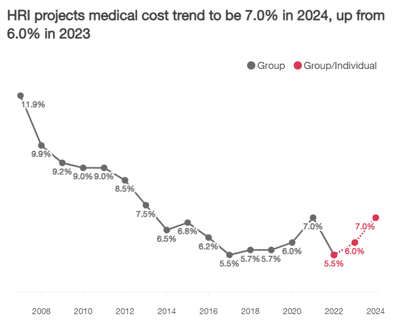Healthcare costs are expected to grow 7% in 2024 due to rising pharmaceutical expenses driven by specialty drugs and insurers increasing rates in response to inflation, according to an annual report from professional services firm PricewaterhouseCoopers (PwC). This trend is higher than 2022’s and 2023’s projected medical cost rates, which were 5.5% and 6%, respectively. The report surveyed U.S. health plans covering 100 million group members and 10 million Affordable Care Act marketplace members.
Source: PwC Health Research Institute medical cost trends, 2009-2024
High-cost medications, drug shortages, and supply chain disruptions are driving healthcare costs upward. For example, new cell and gene therapies, many of which have recently been approved by the U.S. Food and Drug Administration, and heightened demand for expensive GLP-1 diabetes and obesity drugs are drivers of medical cost trends heading into 2024 and beyond.
While inflation impacted the U.S. economy in 2022, it was not significant in the healthcare industry because prices tend to be locked in existing annual or multiyear provider contracts. However, providers continue to experience worker shortages and increased labor costs, causing them to seek higher reimbursement from payers to recoup financial losses. Additionally, increased healthcare utilization will likely impact health plans in 2024.
Despite the expected rise in healthcare costs, some trends are easing this pressure. Such trends include the expanded availability of biosimilar drugs and the transitioning of individuals from expensive inpatient hospital settings to affordable outpatient care. The following are other factors that will likely impact healthcare costs:
- Value-based care investments
- Behavioral health care utilization
- Health equity initiatives
- Price transparency rules
- Impacts of COVID-19
- Medicaid redeterminations
Monitoring these factors will be critical to aid employers in reducing their future medical costs.
What This Means
The PwC report highlights how tackling affordability and rising healthcare costs will continue to be top challenges for employers for the foreseeable future. Employers will need to find new strategies, rework existing business models and take advantage of transformational opportunities, including investing in innovation and technology, to lessen the impact of rising healthcare costs on their organizations. Understanding medical cost trends can help employers act now to protect themselves against increasing healthcare costs and better support their employees.
Have a Question?
Ask CEO & Founder Tony Maffeo

Check out other Resources from IBG
This Blog Post is not intended to be exhaustive nor should any discussion or opinions be construed as professional advice. © 2023 Zywave, Inc. All rights reserved
